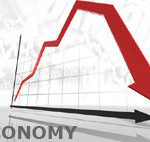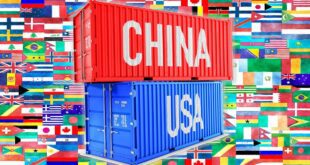The plunge in emerging markets that started this year has given us the Fragile Five (Indonesia, South Africa,  Brazil, Turkey and India), courtesy of Morgan Stanley, because their big current-account deficits mean they are acutely vulnerable to a sudden exit of foreign capital. The trouble is, it isn’t true. The next crisis will start, as did the last one, in one of the developed economies [and this time round] it is far more likely to come from France, Germany, Britain, Australia or Canada. Those nations are the real Fragile Five — and far too few investors are worrying about them.
Brazil, Turkey and India), courtesy of Morgan Stanley, because their big current-account deficits mean they are acutely vulnerable to a sudden exit of foreign capital. The trouble is, it isn’t true. The next crisis will start, as did the last one, in one of the developed economies [and this time round] it is far more likely to come from France, Germany, Britain, Australia or Canada. Those nations are the real Fragile Five — and far too few investors are worrying about them.
So says Matthew Lynn (morningstar.com) in edited excerpts from his original article* entitled UPDATE: Next crisis won’t come from the emerging markets.
[The following is presented by Lorimer Wilson, editor of www.munKNEE.com and may have been edited ([ ]), abridged (…) and/or reformatted (some sub-titles and bold/italics emphases) for the sake of clarity and brevity to ensure a fast and easy read. This paragraph must be included in any article re-posting to avoid copyright infringement.]
Lynn goes on to say in further edited excerpts:
In fairness, there is some logic to the five emerging markets that have been singled out as likely to run into trouble as the global capital markets wobble. Any economy that depends on foreign capital to fund itself is vulnerable to sudden swings of mood. If that money suddenly heads home, it can be plunged into crisis very quickly. Currencies tumble, and interest rates have to rise very quickly – as Turkey has just discovered – and yet there is nothing intrinsically bad about developing nations drawing in foreign capital. If it is being invested in new roads, airports and factories, it is usefully deployed. Fast-growing nations find it hard to finance themselves completely internally, in the same way that fast-growing companies do.
In fact, the real risks are in the developed world. With unaffordable debts, slow growth, unbalanced economies, bloated banking systems, and often big trade deficits as well, that is where the trouble will come from.
Here, instead, are the real Fragile Five that investors should be worrying about.
1. France:
The only economic measure on which France outperforms these days is the rate at which it is racking up fresh debt. This year, the government admits debt will go past 95% of gross domestic product, close to the 100% level at which it starts to get out of control.
The country is on the edge of a fresh recession, even as the rest of the euro zone witnesses a modest recovery. Unemployment is punishing, rising to 11.1% of the workforce in December. The trade deficit is already 2.2% of GDP, and rising all the time — a worrying sign for what was traditionally a major manufacturing and exporting economy. In reality, the French economy has been living on past glories for a generation. It is now just one crisis away from a meltdown.
2. The U.K.:
Britain is recovering at one of the fastest rates in the developed world, and unemployment is down sharply. In fact, the British have cleverly recreated a mini-version of the 2005-2008 boom. Rising debt, and soaring house prices, are reviving the economy, with a massive government debt and low interest rates throwing fuel on the fire.- it is just as unbalanced as it ever was, and its banking sector is just as bloated.
The trade deficit is getting close to 4% of GDP — higher than ‘fragile’ Indonesia, and not much less than India. If any economy is vulnerable to a run on its currency, it is this one.
3. Germany:
The strongman of Europe only looks “strong” when lined up against the weaklings alongside it. Industrial production was down 0.6% last month. Retail sales were down by 2.5% in December, and rose by a barely perceptible 0.1% over the whole of 2013. Overall, the economy is expected to have expanded by just 0.25% in the latest quarter…
With its aging population, soaring energy costs, and over-regulated markets, the German economy is an accident waiting to happen. Its huge and overpriced bond market will get hammered when it happens.
4. Australia:
more than 3.5% of GDP, even if it has narrowed in recent months. It is a sure sign that Australians have been living beyond their means.
The Australian dollar has been hammered, falling 13% against the U.S. dollar last year.Sooner or later, the Chinese economy will rebalance more toward services, and higher-end goods, and that will mean it needs fewer Australian raw materials. When it happens, the economy will be in big trouble.
5. Canada:
…Slashing interest rates when Canada had been barely touched by the financial crisis now looks like a mistake, creating a wholly unnecessary property boom. Now that the economy has slowed down the housing bubble is, inevitably, going to unwind — and we all know what comes next when that happens.
Conclusion
No one knows precisely where the next crisis will come from, of course but imagining it will come from the low-debt, fast-growth developing world is very twentieth century.
In this decade, the trouble will come from the developed world, just as it did in 2008 — and Canada, Australia, the U.K., France and Germany – the real Fragile Five – are the potential flash points.
[Editor’s Note: The author’s views and conclusions in the above article are unaltered and no personal comments have been included to maintain the integrity of the original post. Furthermore, the views, conclusions and any recommendations offered in this article are not to be construed as an endorsement of such by the editor.]
* http://www.morningstar.com/advisor/t/87422329/update-next-crisis-won-t-come-from-the-emerging-markets.htm (©2014 Morningstar Advisor. All right reserved. Free eNewsletters & Magazine)
Related Articles:
1. Is a Real Estate Bust Coming to Canada – Finally?
The Canadian housing market is headed for a significant bust, in my view. It’s going to be a repeat of the 2008 mortgage bubble deflation. Only it’s happening to the north. People will lose a lot of money but those who understand and are properly positioned may gain fortunes. Read More »
2. Debt Clocks of the U.S., U.K., Canada, Australia & the World
A BIS study released in June 2012 warns that budgets of most advanced economies, excluding interest payments, “would need 20 consecutive years of surpluses exceeding 2 per cent of gross domestic product – starting now – just to bring the debt-to-GDP ratio back to its pre-crisis level”. Read More »
3. Canada’s Economy Is In Trouble – Here Are 6 Reasons Why
 munKNEE.com Your Key to Making Money
munKNEE.com Your Key to Making Money





The basic question is:
How much difference would it make to your portfolio, where the next crisis began since the financial world is so closely intermingled these days?
Now consider this more important basic algebraic question:
If you knew that PM’s value would double while at the same time the value of your stocks would fall to half their current value, what percentage of your current portfolio would you have to have already invested in PM to have your portfolio still remain at 100% of its current value after the above revaluation?
Answer:
You should have 1/3 of the value of your portfolio in PM’s…
Good Luck